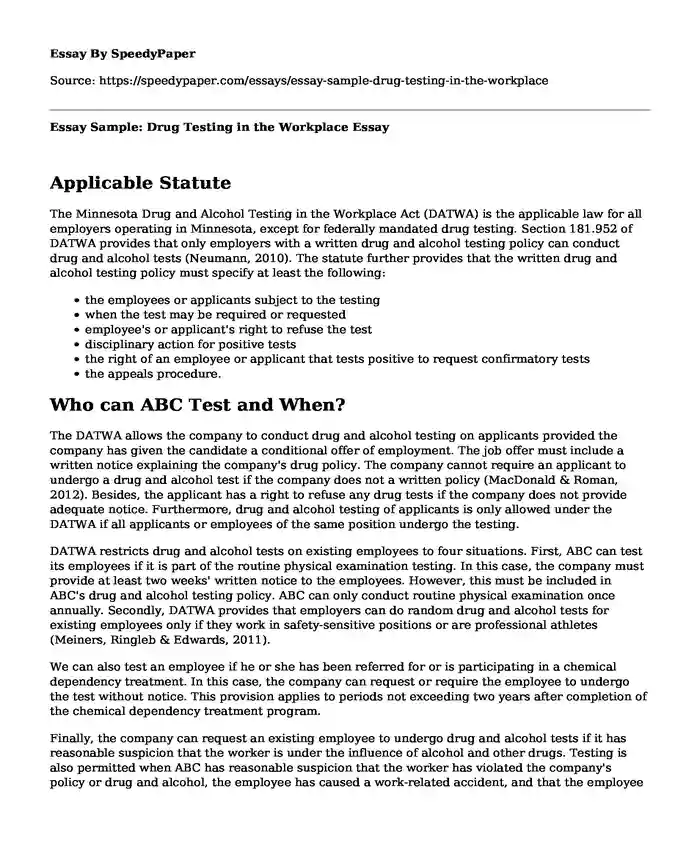
| Type of paper: | Essay |
| Categories: | Drug Business law |
| Pages: | 3 |
| Wordcount: | 794 words |
Applicable Statute
The Minnesota Drug and Alcohol Testing in the Workplace Act (DATWA) is the applicable law for all employers operating in Minnesota, except for federally mandated drug testing. Section 181.952 of DATWA provides that only employers with a written drug and alcohol testing policy can conduct drug and alcohol tests (Neumann, 2010). The statute further provides that the written drug and alcohol testing policy must specify at least the following:
- the employees or applicants subject to the testing
- when the test may be required or requested
- employee's or applicant's right to refuse the test
- disciplinary action for positive tests
- the right of an employee or applicant that tests positive to request confirmatory tests
- the appeals procedure.
Who can ABC Test and When?
The DATWA allows the company to conduct drug and alcohol testing on applicants provided the company has given the candidate a conditional offer of employment. The job offer must include a written notice explaining the company's drug policy. The company cannot require an applicant to undergo a drug and alcohol test if the company does not a written policy (MacDonald & Roman, 2012). Besides, the applicant has a right to refuse any drug tests if the company does not provide adequate notice. Furthermore, drug and alcohol testing of applicants is only allowed under the DATWA if all applicants or employees of the same position undergo the testing.
DATWA restricts drug and alcohol tests on existing employees to four situations. First, ABC can test its employees if it is part of the routine physical examination testing. In this case, the company must provide at least two weeks' written notice to the employees. However, this must be included in ABC's drug and alcohol testing policy. ABC can only conduct routine physical examination once annually. Secondly, DATWA provides that employers can do random drug and alcohol tests for existing employees only if they work in safety-sensitive positions or are professional athletes (Meiners, Ringleb & Edwards, 2011).
We can also test an employee if he or she has been referred for or is participating in a chemical dependency treatment. In this case, the company can request or require the employee to undergo the test without notice. This provision applies to periods not exceeding two years after completion of the chemical dependency treatment program.
Finally, the company can request an existing employee to undergo drug and alcohol tests if it has reasonable suspicion that the worker is under the influence of alcohol and other drugs. Testing is also permitted when ABC has reasonable suspicion that the worker has violated the company's policy or drug and alcohol, the employee has caused a work-related accident, and that the employee has sustained personal injury or has caused harm to another worker (MacDonald & Roman, 2012).
Independent Contractors
DATWA applies to independent contractors as well as employees of independent contractors (Neumann, 2010). It implies that ABC can do the drug testing on the independent contractor or its employees. When an independent contractor applies to work with ABC Inc., it must agree to adhere to the company's drug and alcohol testing policy.
Employees or Applicants Who Test Positive
If an applicant fails a test, the company cannot withdraw the job offer without a confirmatory test. The applicant has the right to a confirmatory test and to explain why the test was positive (Neumann, 2010). For instance, recent medical treatment is a justifiable reason for the applicant. If the confirmatory test is positive, the company shall have the right to withdraw the job offer.
ABC cannot fire an employee who tests positive without a confirmatory test (Neumann, 2010). However, the law allows ABC to suspend the employee or transfer him to another position pending the results of the confirmatory test if the employee works in a safe-sensitive position. If the confirmatory test is still positive, the company cannot fire the employee if it is the first time the employee has tested positive. Employees that test positive for the first time have the right to enroll in drug counseling or rehabilitation, at the cost of the employee or the benefit plan (Neumann, 2010). If the employee refuses drug counseling and rehabilitation, ABC has the right to fire him or her.
Possible Litigation
If ABC Inc. violates the DATWA, the affected employee can sue the company. The employee can be awarded actual damages, emotional distress damages, among others (Neumann, 2010).
The court may also award the employee an injunctive relief and order the firm to reinstate the worker. Besides, the court can award punitive damages against the company.
References
MacDonald, S., & Roman, P. (2012). Drug testing in the workplace. New York: Springer Science & Business Media.
Meiners, R., Ringleb, A., & Edwards, F. (2011). The legal environment of business. Cengage Learning.
Neumann, A. (2010). Workplace Drug and Alcohol Testing. Research Department Minnesota House Of Representatives.
Cite this page
Essay Sample: Drug Testing in the Workplace. (2022, Jun 07). Retrieved from https://speedypaper.net/essays/essay-sample-drug-testing-in-the-workplace
Request Removal
If you are the original author of this essay and no longer wish to have it published on the SpeedyPaper website, please click below to request its removal:
- Free Essay Sample: Global Green Books Publishing Case 1
- Marketing Course Work Example for Free
- Essay Example: The Positive Impact of Electronic Sports on College Students
- Literary Essay Example: Character Analysis in Young Goodman Brown
- Essay Sample on Journal Entry: Ethical Issues
- Intercultural Communication - Free Essay Sample for Your Inspiration
- Essay Sample on Strategies to Overcome the Challenges Faced by the Emiratis in the Airlines
Popular categories




